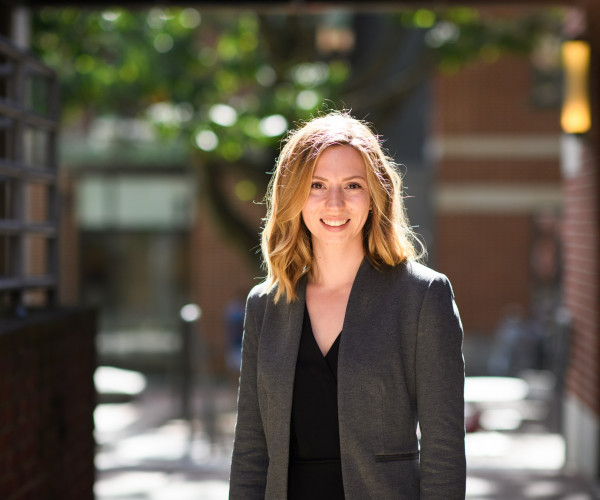ML degree helps Penn’s Assistant Privacy Officer Sarah Finnerty ML’18 safeguard community’s privacy
For Sarah Finnerty ML’18, Penn Law’s Master in Law (ML) program helped propel her along a new career path in the field of privacy. A former intelligence officer in the U.S. Air Force, Finnerty first joined the Penn community in 2016 when she took an administrative position in the Office of Audit Compliance and Privacy. There, she was increasingly exposed to the work of privacy professionals, who are stewards of Penn and Penn Medicine’s data practices: ensuring secure storage of data, providing notice of privacy policies and data collection, and addressing privacy issues associated with faculty and student research.
Looking back on her time in the Air Force, Finnerty found that a lot of the work was similar to things she had enjoyed as an intelligence officer, particularly incident management and research. She soon transitioned from her administrative role into a privacy analyst position. Increasingly interested in potentially pursuing a career in privacy law, Finnerty considered taking the LSAT to eventually pursue a J.D. degree, but was hesitant to step away from her work at Penn.
“I thought, ‘I’m getting all this amazing work experience that you can’t replicate unless you’re doing it, I don’t want to give that up,’ and then [the ML] program was brought to my attention,” she said.
Offering the ability to earn a degree at Penn Law while working full time, the ML program offered the ideal opportunity for Finnerty to learn the law while keeping a hand in the professional world of privacy.
She began the program in fall of 2016, and was immediately struck by how closely the courses aligned with issues she dealt with in her work.
“I decided to try the Technology, Law, and Ethics course to get my toes in the water, and it was amazing,” said Finnerty. The class addressed issues at the cutting edge of privacy and technology, such as the rise of automated vehicles and what it means for the law surrounding search and seizure, which has been evolving for decades as new technologies have developed. “I loved tackling these ethical questions of new technology, because that’s what privacy [law] is — it’s not set in stone. We have a very different approach to privacy in the United States than other countries do, so you’re answering a new question every day that you haven’t thought of before.”
Next, Finnerty took the course “Navigating the Regulatory State,” a required course in the Master’s program.
“Privacy [law] in the U.S. is very much handed down from the regulators, so learning about notice and comment, when something becomes a final rule, how to interface with regulators, and whether individuals have rights against a corporation under a particular regulatory body—understanding all of that really cleared up a lot of fogginess that I had around what goes on in the regulatory space,” she said.
Ultimately, she completed the ML degree program in just two years, graduating in spring of 2018. Just a few months after earning the degree, Finnerty was promoted to her current role: Assistant Privacy Officer for the University of Pennsylvania.
In her new position, Finnerty is responsible for contract review as well as negotiating privacy and confidentiality terms, particularly if there is HIPAA-covered medical data or student information involved. She also works on agreements between the university and third-party vendors, and helps to ensure that the technologies and surveys associated with research at the university all work within the parameters of Penn’s privacy policy. Given her responsibilities, the background she has gained on subjects like business law, regulatory law, and more technical issues like indemnification has been useful on a day to day basis.
“I work with privacy professionals, [and] the best part is that I can now engage in conversations that are more ethical and theoretical with people who have been in the space for so long,” she said. “Being able to think in a different way — the same way as people who have been in the space as lawyers — has been invaluable.
“I don’t think I could be in the position that I’m in today without the ML program.”





